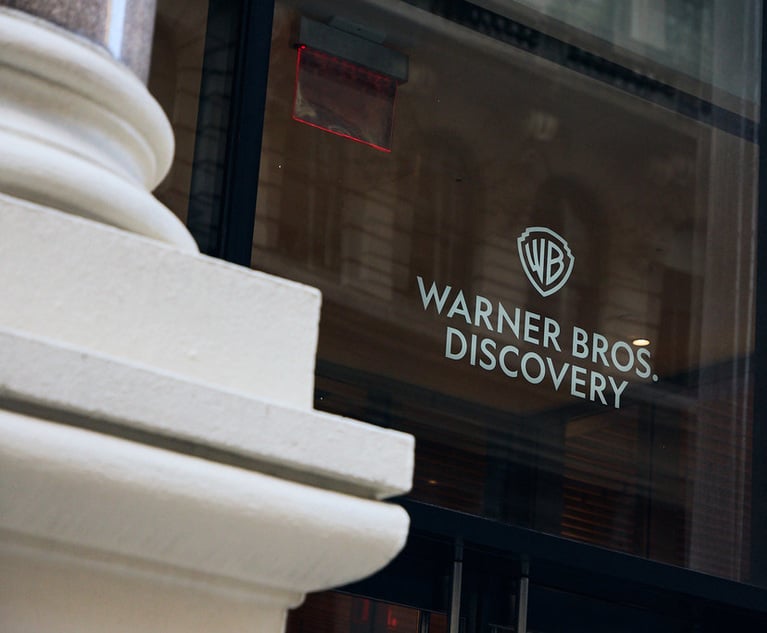Attorneys Skeptical of Boeing's Promise of $100M to Address 737 Max 8 Plane Crashes
The aerospace company has announced it will partner with local governments and nonprofit entities to address the needs of victims and affected communities, but attorneys said it won't provide answers or obviate potential punitive damages.
July 09, 2019 at 03:14 PM
6 minute read
 The Boeing Co. 737 MAX airplane stands outside the company's manufacturing facility in Renton, Washington, on Dec. 8, 2015. Photo: David Ryder/Bloomberg
The Boeing Co. 737 MAX airplane stands outside the company's manufacturing facility in Renton, Washington, on Dec. 8, 2015. Photo: David Ryder/Bloomberg
Boeing has recently promised to provide $100 million in funds to the families and communities affected by the crashes of the 737 Max 8 planes, but attorneys are balking at the announcement, saying that details of the fund are vague at best, and, at worst, may signal an attempt by the company to evade the full extent of its liability.
Last week, aviation industry giant Boeing announced it was establishing a $100 million fund to “address family and community needs” brought about after a total of 346 people were killed as a result of two plane crashes involving the 737 Max 8. The first crash occurred in October in Indonesia and the second occurred in March in Ethiopia.
Since then, dozens of lawsuits have been filed in the U.S. District Court for the Northern District of Illinois. Claims against the Chicago-based company have focused on allegations that the planes were defectively designed, and that the company failed to properly address clear warnings about the dangers of the plane's design.
In the wake of Boeing's announced $100 million pledge, attorneys said the money would provide little in the way of compensatory recoveries—since the total amount, divided by the number of deceased, amounts to less than $290,000 per victim. Further, attorneys said the pledge fails to provide what the plaintiffs are really seeking: safety upgrades, and answers to the looming questions about how the plane was certified and why it remained in the sky despite clear warnings.
Chicago attorney Robert A. Clifford, who is representing several victims' families, said the funding “appears to be disingenuous,” given the questions that remain. In a statement to the press, he said the money would be better spent on recovering the bodies and providing safety updates.
“The families cannot see a third crash happen and the 'community needs' that Boeing points out in its vague announcement of a $100 million fund would be better spent on focusing on the safety of the flying community,” he said.
Boeing announced its promise July 3, saying the company will partner with local governments and nonprofit entities to address the needs of victims and affected communities, and that the funds will be provided over multiple years. The company also said it planned to release additional details about the funds soon.
When asked about how the funds could affect the litigation, a spokesman for the company said the pledge is “independent” of the lawsuits.
“We've been assessing a variety of ways to assist the families and communities impacted and determined that this is a constructive step that we can take now,” spokesman Peter Pedraza said.
However, not all attorneys are taking the company at its word.
Philadelphia-based Kline & Specter attorney Andrew Stern, who is suing on behalf of a Tennessee resident who died in the crash, said the move seemed aimed at garnering public support in anticipation of the damaging facts that he expects the litigation will showcase. Stern also said he was skeptical that the funds will be completely separate from any pending, and future, litigation.
“First of all, it's very ambiguous. It's extremely ambiguous,” Stern said, adding he was skeptical about the notion that these funds would be inadmissible in court. “A number of people, they figure, will take some money and just move on. And that's what they want.”
Stern added that while the funds seemed to signal the company is unlikely to contest liability, it does nothing to answer lingering questions or mitigate the potential punitive damages the company faces.
“It's more than just money,” Stern said. “They want information and they want answers. The public, and quite frankly the citizens of the world at large, need to understand how and why this happened so it never happens again.”
Miami-based Podhurst Orseck attorney Steven Marks, who is representing more than 30 victims between the two crashes, said he did not think the funds would affect the litigation, and that attempts to use the money as a means of barring claims or capping recoveries for plaintiffs could backfire against the company in a public relations sense.
Marks added he was hopeful the money will get to the victims without any conditions, but said, so far, the announcement about the funds has not been well received by the families.
“I think it's created confusion. It could have been handled better by reaching out to the lawyers representing the victims so we could have its terms communicated to our clients instead of them reading about it in the media,” he said. “But, I don't think any properly informed client is concerned about what is clearly a public relations stunt.”
If the fund does not require some kind of agreement releasing the company from future claims, it would be somewhat of an outlier, according to professors who study civil procedure.
Temple Law School professor Mark Rahdert said typically these voluntary funds are set up to resolve claims before they enter the legal system.
“This strikes me as the kind of situation in which a business looks at the situation and says, 'We fully anticipate substantial claims against us, and we would rather resolve them out of court,'” Rahdert said. “If they can get up front and resolve a lot of claims early, they can save themselves and their insurers the enormous costs of litigation.”
Miami University School of Law professor Sergio Campos said similar funds were set up in the wake of the Sept. 11, 2001, terrorist attacks and the Deepwater Horizon disaster. The Sept. 11 fund was unique because it was funded with taxpayer money, he said, but the Deepwater Horizon fund was set up partly for publicity, partly to get funds to the victims quickly and partly to keep some claims out of the more burdensome court system.
Campos said it is too early to tell if Boeing's funds are likely to achieve those goals.
“Whether this fund would be successful in the sense that the victims do get paid in a much quicker and less costly way would depend on the procedures Boeing would set up from the fund,” Campos said. “With [Deepwater Horizon] there were some challenges. But that's the thing to look at: the nitty-gritty details.”
This content has been archived. It is available through our partners, LexisNexis® and Bloomberg Law.
To view this content, please continue to their sites.
Not a Lexis Subscriber?
Subscribe Now
Not a Bloomberg Law Subscriber?
Subscribe Now
NOT FOR REPRINT
© 2025 ALM Global, LLC, All Rights Reserved. Request academic re-use from www.copyright.com. All other uses, submit a request to [email protected]. For more information visit Asset & Logo Licensing.
You Might Like
View All
COVID-19 Vaccine Suit Against United Airlines Hangs on Right-to-Sue Letter Date
3 minute read

JetBlue Airways Will Pay $2M to Settle DOT Charges of Chronically Delayed Flights

The Week in Data Jan. 2: A Look at Legal Industry Trends by the Numbers
Trending Stories
Who Got The Work
J. Brugh Lower of Gibbons has entered an appearance for industrial equipment supplier Devco Corporation in a pending trademark infringement lawsuit. The suit, accusing the defendant of selling knock-off Graco products, was filed Dec. 18 in New Jersey District Court by Rivkin Radler on behalf of Graco Inc. and Graco Minnesota. The case, assigned to U.S. District Judge Zahid N. Quraishi, is 3:24-cv-11294, Graco Inc. et al v. Devco Corporation.
Who Got The Work
Rebecca Maller-Stein and Kent A. Yalowitz of Arnold & Porter Kaye Scholer have entered their appearances for Hanaco Venture Capital and its executives, Lior Prosor and David Frankel, in a pending securities lawsuit. The action, filed on Dec. 24 in New York Southern District Court by Zell, Aron & Co. on behalf of Goldeneye Advisors, accuses the defendants of negligently and fraudulently managing the plaintiff's $1 million investment. The case, assigned to U.S. District Judge Vernon S. Broderick, is 1:24-cv-09918, Goldeneye Advisors, LLC v. Hanaco Venture Capital, Ltd. et al.
Who Got The Work
Attorneys from A&O Shearman has stepped in as defense counsel for Toronto-Dominion Bank and other defendants in a pending securities class action. The suit, filed Dec. 11 in New York Southern District Court by Bleichmar Fonti & Auld, accuses the defendants of concealing the bank's 'pervasive' deficiencies in regards to its compliance with the Bank Secrecy Act and the quality of its anti-money laundering controls. The case, assigned to U.S. District Judge Arun Subramanian, is 1:24-cv-09445, Gonzalez v. The Toronto-Dominion Bank et al.
Who Got The Work
Crown Castle International, a Pennsylvania company providing shared communications infrastructure, has turned to Luke D. Wolf of Gordon Rees Scully Mansukhani to fend off a pending breach-of-contract lawsuit. The court action, filed Nov. 25 in Michigan Eastern District Court by Hooper Hathaway PC on behalf of The Town Residences LLC, accuses Crown Castle of failing to transfer approximately $30,000 in utility payments from T-Mobile in breach of a roof-top lease and assignment agreement. The case, assigned to U.S. District Judge Susan K. Declercq, is 2:24-cv-13131, The Town Residences LLC v. T-Mobile US, Inc. et al.
Who Got The Work
Wilfred P. Coronato and Daniel M. Schwartz of McCarter & English have stepped in as defense counsel to Electrolux Home Products Inc. in a pending product liability lawsuit. The court action, filed Nov. 26 in New York Eastern District Court by Poulos Lopiccolo PC and Nagel Rice LLP on behalf of David Stern, alleges that the defendant's refrigerators’ drawers and shelving repeatedly break and fall apart within months after purchase. The case, assigned to U.S. District Judge Joan M. Azrack, is 2:24-cv-08204, Stern v. Electrolux Home Products, Inc.
Featured Firms
Law Offices of Gary Martin Hays & Associates, P.C.
(470) 294-1674
Law Offices of Mark E. Salomone
(857) 444-6468
Smith & Hassler
(713) 739-1250








